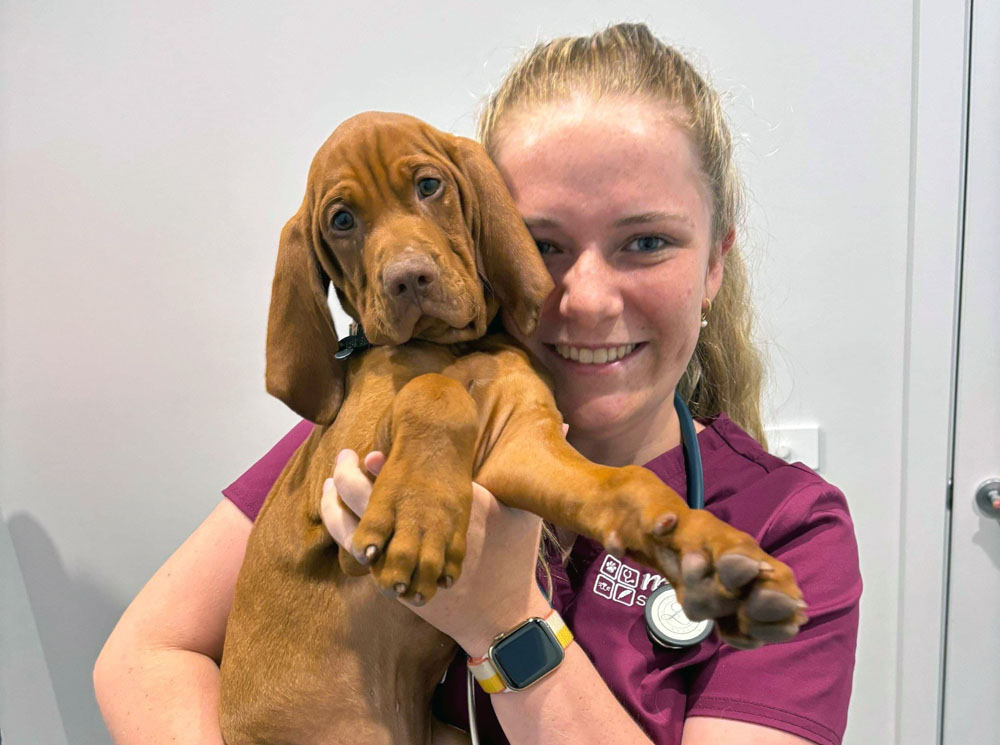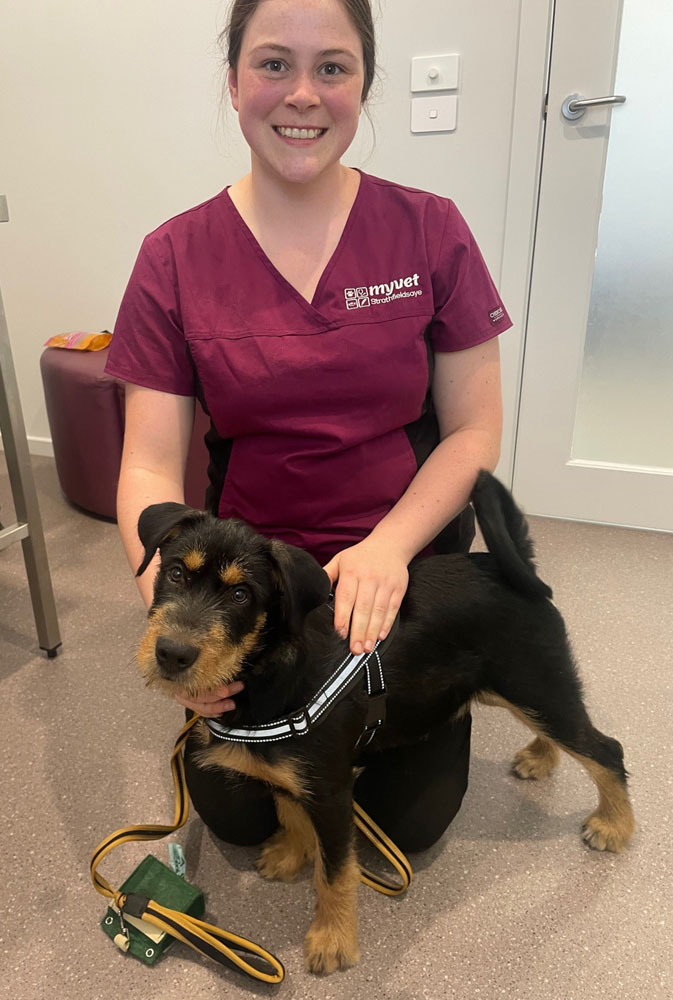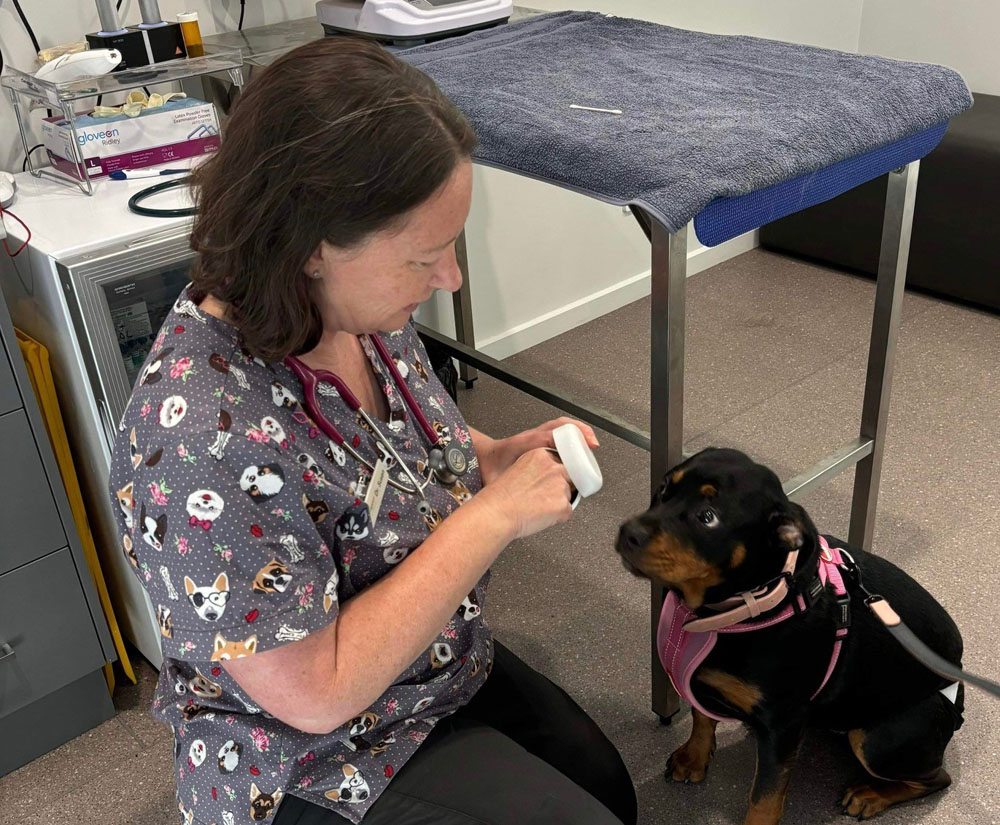Dog Desexing
Ensuring a Loyal Companion's Lifelong Wellbeing: Dog Desexing at MyVet Strathfieldsaye
Welcoming a furry friend into your life brings immense joy, but ensuring their long-term happiness and health requires responsible pet ownership. Dog desexing, also known as dog speying for females and dog castration for males, plays a crucial role in responsible pet care. At MyVet Strathfieldsaye, we offer a compassionate and professional desexing service, prioritising both your dog’s well-being and the broader welfare of the canine community.

Book your Dog Desexing Today at MyVet Strathfieldsaye
Understanding the Importance of Desexing:
Uncontrolled dog reproduction contributes significantly to the issue of unwanted animals, potentially leading to overcrowding in shelters and potential suffering for homeless dogs. Dog desexing plays a vital role in addressing this issue and ensuring a more manageable and stable canine population.
Beyond population control, desexing offers numerous health benefits for your dog:
Reduced Risk of Cancers: Dog spaying significantly lowers the risk of mammary tumours in females, while dog neutering minimises the risk of testicular cancer in males.
Improved Behavioural Traits: Desexing can positively impact behaviour by reducing aggression, marking, and roaming tendencies, enhancing harmony in your household and strengthening the bond between you and your dog.
Longer Lifespan: Studies suggest that desexed dogs may enjoy a longer and healthier life compared to their un-desexed counterparts.
Optimal Timing for Dog Desexing:
The ideal age for dog desexing is often between 6 to 9 months. However varies depending on breed, size, and individual health. Our experienced, local Bendigo veterinarians will guide you in determining the most suitable age for your specific dog, considering their unique circumstances and ensuring optimal timing for their overall well-being. Please feel free to contact us with any questions on the recommended time for desexing-specific to your pet.
The Dog Desexing Procedure:
Dog and puppy desexing is a surgical procedure performed under general anaesthesia by qualified veterinarians. For females, the ovaries and uterus are removed (speying), while for males, the testicles are surgically removed (castration). The surgery is routine, and your dog will receive proper pain management throughout the process
Benefits of Desexing your Dog:
By choosing to desex your dog, you contribute to a multitude of positive outcomes:
Prevention of unwanted litters: This helps address the issue of pet homelessness and ensures a more balanced canine population.
Enhanced health: Reduced risk of cancers and potential for a longer, healthier life for your dog.
Improved behaviour: Less aggression, marking, and roaming, leading to a calmer and more relaxed companion.
Stronger bond: Reduced behavioural challenges can enhance your connection with your dog and contribute to a more harmonious living environment.

Peace of Mind with Safety for your Puppy:
Dog speying is a common and safe procedure when performed by experienced professionals like our team at MyVet Strathfieldsaye. The benefits far outweigh the minimal risks associated with the surgery. Our veterinarians in Bendigo will thoroughly assess your dog’s health before proceeding and provide detailed post-operative care instructions for a smooth and uneventful recovery.
Supporting Your Dog's Recovery:
Most dogs resume normal activities within a week after desexing. Following your vet instructions regarding activity restrictions and monitoring for any complications is crucial for a smooth healing process. We are here to support you and your pet throughout the recovery journey.
Addressing Your Concerns:
We understand you may have questions or concerns about desexing your dog. Our veterinarians are happy to discuss:
Potential risks and how we minimise them.
Recovery process and what to expect.
Individualised care based on your dog’s unique needs.
Behavioural changes you might observe and how to manage them
Personality and Playfulness:
Desexing does not negatively impact your dog’s personality or playfulness. In fact, it often leads to positive behavioural changes like reduced aggression and increased calmness. Remember, each dog is unique, so observe their behaviour and rest assured that desexing is generally well-tolerated.

Special Considerations:
Desexing a dog in heat or pregnant is not recommended. If you suspect pregnancy, consult your veterinarian immediately. Alternative options or the best time to proceed will be discussed based on your dog’s specific situation.
Beyond Desexing:
While desexing is a common and effective method of population control and health management, there may be alternative options in specific cases. This could include hormonal treatment. However, consulting with MyVet Strathfieldsaye about the pros and cons of each option is essential to make an informed decision based on your dog’s individual needs and circumstances.
A Commitment to Compassionate Care:
At MyVet Strathfieldsaye, we believe every Bendigo dog deserves a healthy and happy life. Our compassionate and professional dog desexing service prioritises your pet’s well-being while contributing to a more balanced and healthy canine community. Book online your dog desexing or call
(03) 5439 5066
FAQS
Dog desexing, also known as dog speying (for females) or dog neutering (for males), is crucial for various reasons. Firstly, it helps control the pet population, reducing the number of unwanted dogs. Secondly, desexing provides health benefits, including a lower risk of certain cancers and behavioural improvements, such as decreased aggression and roaming tendencies.
The ideal age for dog desexing is often between 6 to 9 months. However, the timing can vary depending on the breed, size, and individual health of your dog. Consult with your veterinarian to determine the best age for your pet, taking into consideration their unique circumstances.
Dog desexing is a surgical procedure performed under general anaesthesia. For females, it involves the removal of the ovaries and uterus (speying), while for males, it entails the removal of the testicles (castration). The surgery is routine, and your dog will receive proper pain management to ensure a comfortable recovery.
Dog desexing offers various benefits. It helps prevent unwanted pregnancies, reduces the risk of certain cancers, and can improve behaviour by minimising aggression, marking, and roaming tendencies. Additionally, desexing contributes to a longer and healthier life for your canine companion.
Yes, dog desexing is a common and safe procedure when performed by a qualified veterinarian. The surgery is routine, and complications are rare. Your veterinarian will conduct a pre-surgery examination to ensure your dog is in good health and discuss any potential risks associated with the procedure.
Recovery time for dog desexing varies, but most dogs resume normal activities within a week. Your veterinarian will provide post-operative care instructions, which may include limiting physical activity and monitoring for any signs of complications. Proper care during the recovery period is essential for a smooth healing process.
MyVet Strathfieldsaye veterinarians will conduct a thorough pre-surgery examination to ensure your cat is a suitable candidate for desexing. They will also discuss any potential risks and provide detailed post-operative care instructions to promote a smooth and uneventful recovery for your pet.
Complications with dog desexing are rare, but as with any surgery, there are minimal risks such as infection or adverse reactions to anaesthesia. MyVet Strathfieldsaye takes precautions to minimise these risks, ensuring the safety of your dog during the procedure.
Dog desexing can lead to positive behaviour changes. Desexed males may exhibit less aggression and a decreased tendency to roam, while desexed females may experience a reduction in behaviours such as heat-related restlessness and marking. However, individual responses can vary, MyVet Strathfieldsaye can provide insights based on your dog’s specific characteristics.
During the pre-surgery consultation, your veterinarian will discuss any potential risks based on your cat’s health and provide information on how to recognise and address any postoperative complications.
It is generally recommended to wait until your dog is out of heat or has completed a pregnancy before desexing. Performing the procedure during these conditions may pose additional risks. Consult with MyVet Strathfieldsaye to determine the best course of action, and they will guide you based on your dog’s specific circumstances.
While dog desexing is a common and effective method of population control and health management, there are alternative options. These may include hormonal treatments to suppress heat cycles or behavioural interventions. However, it’s essential to discuss the pros and cons of each option with MyVet Strathfieldsaye to make an informed decision based on your dog’s needs.
Your veterinarian will guide you on appropriate measures to ensure the health and well-being of both the pregnant cat and potential kittens. This emphasises the importance of regular veterinary check-ups to address any reproductive-related concerns promptly.
